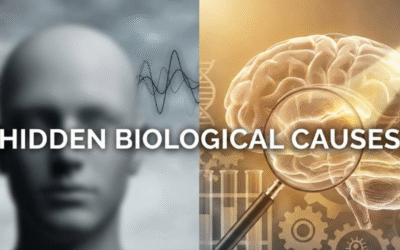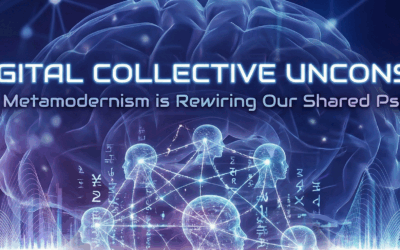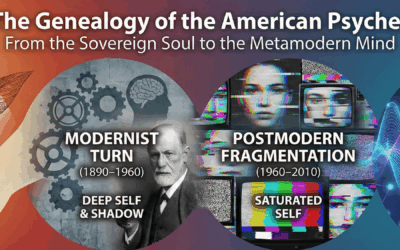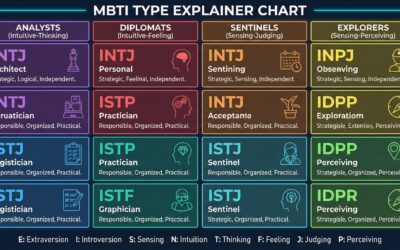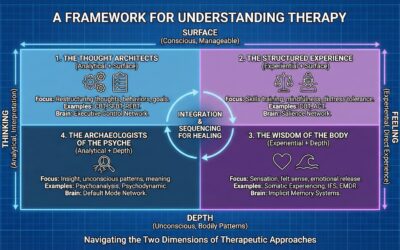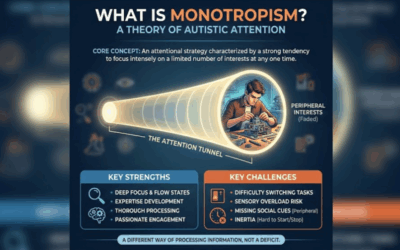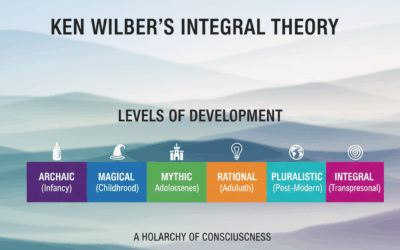A critical deep dive into the hidden history of psychotherapy, exploring how the personal traumas of founders like Freud and Jung collided with societal forces to shape modern mental health. Drawing on the works of Adam Curtis, James Hillman, and Sonu Shamdasani, this article traces the shift from the “architecture of the soul” to the “technocratization of care,” exposing the impact of profit motives and algorithmic logic while proposing a metamodern path forward for the profession.
therapist near me
Expert-Led Insights on Trauma, Depth Psychology, and Healing
Welcome to the Taproot Therapy Collective Blog, your deep-dive space into trauma-informed therapy, depth psychology, and the cultural forces shaping mental health today. Our goal is to be a trusted, authoritative resource for individuals and professionals seeking to understand the complex links between the psyche, the body, and society.
Authored by Licensed Clinical Experts
As a YMYL (Your Money, Your Life) resource, we prioritize E-E-A-T (Experience, Expertise, Authoritativeness, and Trustworthiness). Every article is authored and clinically reviewed by our team of licensed therapists in Birmingham, Alabama. Our writers share their firsthand clinical experience and deep expertise in fields ranging from Jungian insights and somatic healing to cutting-edge, evidence-based modalities.
Explore Our Core Topics
Our blog explores the forefront of mental health, including:
- Evidence-Based Modalities: In-depth guides on EMDR (Eye Movement Desensitization and Reprocessing)—a practice standardized by organizations like EMDRIA—and advanced neuromodulation techniques.
- Depth & Somatic Psychology: Investigations into dream analysis through a Jungian lens, shadow work, and how somatic trauma mapping helps track pain that lives inside the body.
- Integrative & Cultural Topics: Discussions on the role of micro-nutrition, media psychology, and critical issues like the weaponization of collective trauma in our digital era.
A Resource for Our Alabama Community and Beyond
While our insights are relevant globally, we are rooted in the Birmingham community. We regularly share resources for therapists and mental health seekers in Alabama. Our writing bridges clinical depth with cultural relevance, designed to help you find articles that resonate and cultivate new possibilities for growth, resilience, and meaningful connection.
Search the Blog by Category
The Influencing Machine: How Technology Shapes the Architecture of Psychosis
Explore how technological delusions in psychosis evolved from the 1810 Air Loom to modern simulation theory, revealing deep truths about technology’s impact on the human psyche and offering insights for healing in the digital age.
Is My Friend or Business Partner a Con Artist?
Understanding the Psychology Behind Deception and Emotional Manipulation Have you ever wondered if your business partner is a con artist? Perhaps you've noticed a pattern where their stories don't quite add up, where their accomplishments seem to exist only in...
Rise and Fall of the Empire and The Ego: Ancient Rome as a Therapy Case Study
I've been a trauma therapist for over a decade, and I've noticed something strange happening in the last few years. My patients aren't just coming in with anxiety or depression or PTSD. They're coming in with something harder to name—a pervasive sense that nothing...
When the Screens Go Dark: What Hospital Cyberattacks Reveal About Our Collective Dependence on Systems We Cannot Control
When the Screens Go Dark: What Hospital Cyberattacks Reveal About Our Collective Dependence on Systems We Cannot Control A recent episode of HBO’s The Pitt dramatized what thousands of real healthcare workers have already lived through—and what it teaches us about...
Using John Gardener’s Grendel to Find the Monster in Your Shadow Side
Who was John Gardner? John Gardner's "Grendel" is a postmodern retelling of the Old English epic poem "Beowulf," which explores themes of existentialism, nihilism, and the nature of evil through the eyes of the titular monster. Published in 1971, the novel is a prime...
Why Americans Can’t Access Cuban Drugs That May Work Better Than What We Have
The 90-Mile Medicine Gap: Inside the paradox of American pharmaceutical innovation: We lead the world in drug development but struggle to translate that into affordable, accessible care—while a small island nation under economic embargo may have developed better...
The Hidden Dynamics of Executive Leadership
The Psychic Infrastructure of Power The modern boardroom is not merely a place of financial calculation; it is a ritual space where the unconscious forces of the collective psyche play out in high definition. While MBA programs teach strategy, they rarely address the...
Søren Kierkegaard: The Dizziness of Freedom and the Courage to Be Yourself
By The Clinical Team at GetTherapyBirmingham.com The First Psychologist of the Modern Soul If you have ever stood at the edge of a cliff and felt a strange, vertigo-inducing pull—not the fear that you might slip, but the terrifying realization that you could jump—then...
The Hidden Influence of Parts on Parenting: Why Parents Treat Children Differently
Parental Parts & Differential Treatment of Children: A Parts-Based Perspective It is a commonly observed phenomenon that parents often treat their children differently, even when they strive to be fair and equal. Birth order is often cited as a key reason—the...
Is Schizophrenia really C-PTSD: What I Learned Working with Psychosis
When Trauma Looks Like Schizophrenia: What I Learned Working with Psychosis The line between "broken brain" and "shattered self" is far blurrier than psychiatry admits. Key Points: Up to 80% of people diagnosed with schizophrenia have histories of severe childhood...
How to Understand Internal Family Systems – IFS Therapy
Alabama Is Testing Whether Politicians Can Override Your Professional Board : And Every Licensed Professional and Every State Should be Watching the Precedent
Analysis of Alabama’s HB 382 and HB 152: how state legislation creates a “sovereignty trap” that could bypass professional licensing boards, trap nurses as a captive workforce, and let legislatures redefine what it means to be a doctor, nurse, lawyer, or social worker.
What is the Spyglass Method in Dating?
There's a moment in early dating that almost everyone knows. Things are going well. The conversation flows. You're excited to see their name on your phone. And somewhere in the back of your mind, a small voice whispers: Please don't let me find out something that...
The Secrets in the Crypt: What’s Hidden in the Sealed Freud Archives and Why It Matters
Somewhere in the Library of Congress sits a collection of documents that has shaped how we understand the human mind. The Sigmund Freud Papers contain letters, case notes, interviews, and personal correspondence spanning the birth of psychoanalysis. They should be...
What If Your Mental Health Diagnosis Has a Hidden Cause? The Biological Triggers Most Doctors Never Test For
When someone receives a diagnosis like bipolar disorder, schizophrenia, severe OCD, or even autism, they're usually told it's a lifelong condition. They're given medications to manage symptoms and counseled to accept that this is simply how their brain works. Parents...
Who was Theodore Millon?
The Grand Unifier: Theodore Millon and the Mathematical Architecture of the Self In the fragmented landscape of 20th-century psychology, where clinicians pledged loyalty to competing schools of thought like feudal lords, Theodore Millon (1928–2014) stood as a rare...
Why Do We Need Matter to Tell Us We Matter? Psychotherapy’s Search for Meaning Between Science and Spirit
Why do we need matter, the physical universe as described by science, to tell us that we matter, that our lives have significance and meaning? Consider what happens when someone faces a crisis of meaning. They might turn to religion for assurance that a divine creator...
The ICD Crisis: How the U.S. Withdrawal from WHO Threatens Your Practice’s Ability to Get Paid
The ICD Crisis: How the U.S. Withdrawal from WHO Threatens Your Practice's Ability to Get Paid On January 22, 2026, something happened that most therapists barely noticed, yet it threatens the fundamental infrastructure of how we get paid for our work. The United...
The Frankfurt School and the Architecture of Modern Trauma: Critical Theory’s Influence on Psychotherapy, Culture, and the Built Environment
The Frankfurt School and the Architecture of Modern Trauma: Critical Theory's Influence on Psychotherapy, Culture, and the Built Environment How a group of exiled German-Jewish intellectuals transformed our understanding of psychology, society, and the spaces we...
A Critical History of the Diagnostic and Statistical Manual of Mental Disorders
THE ARCHITECTURE OF AMERICAN MADNESS Leadership Dynamics, Economic Imperatives, and the Epistemological Crisis of Psychiatric Diagnosis By Joel Blackstock, LICSW-S Clinical Director, Taproot Therapy Collective "The DSM is not a description of nature. It is a...
What is a Diagnosis Anyway: Is the DSM Dying Part 2
The Archaeology of a Label: What We Forgot About Diagnosis and Why It Matters Now By Joel Blackstock, LICSW-S | Clinical Director, Taproot Therapy Collective Part II of A Critical Investigation into the Document That Defines American Mental Health Contents...
Why is The State of Alabama Trying to Get Rid of the School of Social Work: Why Closing Little Hall Could Mean Big Problems
Analysis of Alabama House Bill 152 and its threat to the University of Alabama School of Social Work—examining the 1965 statutory origins, the anti-DEI political context, accreditation risks, and implications for Alabama’s mental health workforce and clinical social work licensing pipeline.
Can Therapists Start a Union? Spoiler Alert: They Can’t.
Can Therapists Start a Union? The Antitrust Trap, the Shadow Committee, and the Economic Strangulation of American Psychotherapy Analyzing America's Healthcare Regulations and Their Effect on Us: Why the Law Prevents Therapists from Organizing While Allowing a Private...
Is the DSM Dying? Rethinking Suffering
A Critical Investigation into the Document That Defines American Mental Health—and Why It May Have Already Failed By Joel Blackstock, LICSW-S | Clinical Director, Taproot Therapy Collective Contents Introduction: The Controversial Bible Part I: The History of a...
NAD+ For Mental Health
The Digital Collective Unconscious: How Metamodernism is Rewiring Our Shared Psyche
When the Unconscious Goes Online What happens when Jung's collective unconscious meets the internet? This question, once relegated to speculative philosophy, has become one of the most pressing concerns of our metamodern age. We are witnessing something unprecedented...
The Genealogy of the American Psyche: From the Sovereign Soul to the Metamodern Mind
The Tectonics of the Self The history of the United States is typically recounted as a sequence of political events, economic shifts, and military conflicts. However, running beneath the surface of constitutional conventions, industrial revolutions, and digital...
Video Game Psychology: What Virtual Worlds Reveal About the Human Mind
In the summer of 2005, a virtual plague swept through the digital kingdom of Azeroth. Players logged into World of Warcraft to find the streets of major cities carpeted with skeletons. A bug had allowed a deadly in-game disease to escape its intended boundaries, and...
Clinical Hypnosis: The Neuroscience and Therapeutic Legacy of Milton Erickson
When most people hear the word "hypnosis," they picture a pocket watch swinging back and forth, a stage performer making volunteers cluck like chickens, or perhaps a sinister figure commanding their subject to do something against their will. These images, drawn from...
Breaking Free of Enmeshment in Family
"We're just really close." "My mom is my best friend." "I tell my daughter everything—we have no secrets." These phrases sound healthy. They're celebrated in our culture. But they can also be the surface presentation of something clinicians call enmeshment—a family...
What is Dopamine Detox: Social Media Pseudoscience or Self Help?
Your feed is full of it: influencers claiming they "detoxed their dopamine" and now feel amazing. Tech bros swearing that 24 hours without screens reset their brain chemistry. Wellness gurus selling dopamine fasting protocols that promise mental clarity, focus, and...
Naomi Quenk’s Work on the Inferior Function
You've had the experience. You're usually calm, but suddenly you're screaming at your partner over dishes. You're normally logical, but you're sobbing uncontrollably about something that "shouldn't" matter. You're typically easygoing, but you've become rigidly fixated...
Understanding How the Different Types of Therapy Fit Together
You've tried therapy before. Maybe it helped a little. Maybe you spent months talking about your childhood without anything changing. Maybe you learned coping skills that worked until they didn't. Maybe the therapist was nice but you left each session feeling like...
How Trauma Disrupts Memory: A Guide to How Trauma is Stored Differently in Different Types of Memory
You remember what you had for breakfast yesterday, but you can't recall years of your childhood. You have no visual memory of the assault, yet your body freezes when someone stands too close. You know the car accident happened, but when you try to tell the story, it...
Somatic Reset Techniques You Can do At Home
Written by the clinical team at Taproot Therapy Collective, a Birmingham psychotherapy practice specializing in somatic and trauma-focused modalities. Our clinicians are trained in body-based approaches including Brainspotting, EMDR, and somatic trauma resolution....
What is Monotropism? New Tools to Understand Autism
Written by the clinical team at Taproot Therapy Collective, a Birmingham psychotherapy practice specializing in neurodivergent-affirming care. Our clinicians work daily with autistic adults, ADHDers, and AuDHD clients navigating a world built for different brains. If...
Alabama Maternal Rights Legal Update: Your Bill of Rights as an Expecting Mother
If you've been searching "maternal mental health laws Alabama" or "postpartum screening mandatory" and feeling your heart race, you're not alone. Rumors are spreading about forced screenings, new medications, and DHR interventions. As a Birmingham-based therapy...
Magnesium L-Threonate vs Magnesium Glycinate: Form Mental Health, Anxiety, and Alcohol Alternative
A Clinician's Comprehensive Analysis of Magnesium Forms, Absorption Science, and How to Optimize Your Nervous System By Joel Blackstock, LICSW-S | Clinical Director, Taproot Therapy Collective 1. The Magnesium Crisis in Mental Health If you're reading this, you've...
Cortisol Face: Separating TikTok Myth from Stress Science
The Viral Claim "You're not ugly, you just have cortisol face." This reassuring phrase, delivered by influencer Mandana Zarghami, has accumulated millions of views across TikTok. The platform has been flooded with before-and-after images: puffy, rounded faces...
The Winter Arc and Hibernating: How Generation Z is Reframing the Dark Months
Three Words for the Same Darkness Generation Z has done something linguistically remarkable. They have invented multiple terms for lying in bed, each carrying entirely different moral weight, each revealing a distinct relationship to rest, productivity, and...
From Gaslight to Weapon: When Therapeutic Language Becomes the Abuse
The Origin of a Word The term "gaslighting" traces to Patrick Hamilton's 1938 stage play "Gas Light" and its celebrated 1944 Hollywood adaptation starring Ingrid Bergman and Charles Boyer. In the film, a husband systematically manipulates his wife into believing she...
The Metamorphosis of the Therapeutic Hour: Why Generation Z Demands a New Psychology
How the Most Therapy-Literate Generation in History is Exposing the Failure of the Biomedical Model and Demanding a Return to Meaning By Joel Blackstock, LICSW-S, Clinical Director, Taproot Therapy Collective Something unprecedented is happening in the consulting...
Your Nervous System is a Storyteller: Understanding Polyvagal Theory Through Myth
Your Nervous System is a Storyteller: Understanding Polyvagal Theory Through Myth The Bio-Mythology of Safety, Danger, and the Underworld By Joel Blackstock, LICSW-S, Clinical Director, Taproot Therapy Collective Long before the emergence of modern neuroscience, human...
The Internal Civil War: Understanding and Treating the AuDHD Brain
The Internal Civil War: Understanding and Treating the AuDHD Brain A Clinical Guide to the Autism-ADHD Intersection There is a particular kind of exhaustion that defies simple explanation. It is not the fatigue of overwork, nor the weariness of too little sleep. It is...
The Hidden Spring: Mark Solms, the Conscious Id, and the Biological Reclamation of the Soul
The Ghost in the Machine Found For over a century, the sciences of the mind have been divided by a seemingly unbridgeable chasm. On one side stood psychoanalysis, the domain of subjective depth, unconscious drives, and the messy, symbolic language of the soul. On the...
The Neuroarchitecture of Oneiric Consciousness: Why Science Finally Agrees with Jung
The Dialectic of Dream Science: From Mysticism to Mechanics and Back For the modern clinician, the subject of dreaming often feels like a professional minefield. On one side, we have the rich, symbolic tradition of Depth Psychology, which views the dream as a...
Trauma Dumping vs. Healthy Sharing: Understanding the Difference
You've probably experienced it: a coworker corners you at the coffee machine and launches into graphic details about their divorce. A new acquaintance at a party shares their childhood abuse within minutes of meeting you. A friend calls and talks for an hour about...
Enmeshment: When Closeness Becomes a Cage
You were the easy one. The one who didn't need much. The one who got good grades, stayed out of trouble, and never complained. While your parents rushed to doctors' appointments, managed medications, navigated meltdowns, or sat vigil at bedsides, you learned to make...
Eggshell Parenting: How Unpredictable Parents Create Hypervigilant Adults
You learned to read the room before you could read books. The sound of a car door closing. The weight of footsteps on the stairs. The particular quality of silence that meant something was wrong. As a child, you developed an exquisitely tuned radar for the emotional...
Is It Love or Limerence? Understanding Obsessive Romantic Attachment
You cannot stop thinking about them. Not for an hour. Not for ten minutes. Your mind returns to them like a tongue to a broken tooth—compulsively, involuntarily, almost against your will. When they text, your heart races. When they don't, you spiral into anxiety,...
The Intellectual Foundations of Ken Wilber’s Integral Theory: A Deep Dive into His Sources
Ken Wilber's Integral Theory: Architecture, Ambition, and the Anatomy of Its Decline Ken Wilber's Integral Theory stands as one of the most ambitious intellectual projects of the late twentieth century, attempting nothing less than a comprehensive synthesis of human...
Moral Injury: Healing the Soul When the System Betrays You
In the lexicon of modern trauma, we are well-versed in Post-Traumatic Stress Disorder (PTSD). We understand the biology of fear: the hyper-arousal, the flashbacks, the fight-or-flight response triggered by a life threat. But there is another kind of wound, one that is...
Explore the Articles by Categories on Our Blog
Blog Categories
Psychology Topics and Articles
A comprehensive exploration of psychology topics spanning the breadth of human experience, from fundamental concepts like memory and emotion to specialized areas like forensic psychology and environmental mental health.
Psychology Articles
Explore the fascinating world of psychology, from depth psychology and symbolism to cognitive, social, and developmental theories. Uncover the mysteries of the human mind and behavior.
Depth Psychology & Jungian Approaches
Jungian Therapy and Depth Psychology
Explore Jungian concepts such as archetypes, the collective unconscious, and individuation. Learn how dream analysis and symbolism facilitate self-awareness and personal growth through the insights of Carl Jung.
Dreams and the Unconscious
Explore the significance of dreams in depth psychology, from Freud’s dream interpretation to Jungian archetypes. Learn how dreams provide insights into the unconscious mind, personal growth, and trauma healing.
Symbolism and Meaning in Psychotherapy
Uncover the profound language of symbolism and meaning-making in the human psyche. Explore universal archetypes, myths, and metaphors through depth psychology and the symbolic dimensions of trauma.
Mythology and Therapy
Journey into the captivating world of classical mythology, focusing on the rich traditions of ancient Greece and Rome. Explore how myths offer profound insights into the human condition and universal themes.
Evidence-Based Practice & Research
Evidence Based Practice and Research Psychology
Explores the frontier of evidence-based practice in psychotherapy, taking a fresh look at the scientific foundations of mental health treatment through the integrative lenses of depth psychology and trauma neurology.
Evidence Based Practice in Therapy
Examines the complex landscape of research-informed therapy while critically evaluating the limitations, biases, and cultural considerations that shape how we apply research findings to real-world clinical practice.
Philosophy & Existential Approaches
Philosophy for Therapists
Explore existentialism, metaphysics, ethics, and the philosophy of mind. Discover insights from renowned thinkers and engage in thought-provoking discussions.
Phenomenology and Existential Psychology
Explore phenomenological and existential approaches to understanding human experience and psychological healing, focusing on lived experience, authenticity, freedom, and meaning-making.
Metamodernism and Deconstruction
Examine how post-postmodern frameworks illuminate contemporary mental health challenges including cultural displacement, narrative fragmentation, authenticity struggles, and the oscillation between hope and despair.
Psychology of Modernism Post Modernism and the Meta Modern
Explore the psychological dimensions of cultural paradigms and their impact on identity, meaning-making, and therapeutic practice.
Neuroscience & Brain-Based Approaches
Neuroscience and the Brain for Therapists
Delve into the intricate relationship between brain function, trauma, and mental health treatment. Discover insights into innovative therapeutic approaches, neuroplasticity, and the role of emotions in healing.
Media & Culture Psychology
Psychology of Film and TV
Explore the hidden dimensions of film and TV through the lenses of depth psychology and trauma neurology. Discover how the moving image reflects and shapes the psyche, both individually and collectively.
Psychology of Media and Culture
Explore the profound psychological and symbolic impact of media and culture on our individual and collective psyche. Uncover the hidden meanings and archetypal themes woven into the fabric of our cultural landscape.
Specialized Psychology Fields
Industrial Organisational Psychology
Explore Industrial-Organizational Psychology, focusing on workplace performance, employee well-being, leadership development, and organizational culture.
Psychology of Buildings and Architecture
Explore the psychology of design and architecture, from the emotional impact of spaces to human-centered design. Learn how architecture influences mental health, well-being, and behavior.
Color Psychology
Explore how colors influence psychological experience, from the neurological mechanisms behind color perception to practical applications in therapeutic environments and creative healing approaches.
Psychology of History
Explore the symbolic significance and psychological undercurrents of historical events through the lens of depth psychology, symbolism, and design psychology.
Psychology of Conspiracy Theories
Examine the psychological dynamics behind conspiracy thinking, critical thinking, and the appeal of alternative narratives in contemporary culture.
Anthropology & Cross-Cultural Psychology
Anthropology and Evolutionary Psychology for Therapy
Embark on a fascinating journey into the deep history of the human psyche, exploring how anthropology and evolutionary psychology shed light on ancient origins of modern minds, behaviors, and cultures.
Spiritual & Religious Approaches
Christian Mysticism in Therapy
Discover the transformative power of Christian mysticism and contemplative spirituality, exploring how practices like centering prayer and lectio divina can heal trauma and facilitate encounters with the deep Self.
Spirituality and The Transcendent Function in Psychotherapy
Explore the intersection of spirituality and depth psychology to uncover the role of spiritual practices in trauma healing, consciousness, and personal transformation.
Comparative Religion for Therapy
Discover the universal quest for meaning, transcendence, and healing across spiritual traditions, exploring key practices and insights from world religions through depth psychology and trauma neurology.
Psychology of Mystics, Gurus, and Spiritual Philosophers
Examine the psychological dimensions of mystical experience and spiritual teaching across various traditions and historical periods.
Specialized Treatment & High-Control Groups
Cults and High Control Group Psychology
Explore the shadowy psychodynamics of coercive control, from cults to abusive relationships. Learn to recognize red flags of undue influence and support recovery processes.
History & Biographical Studies
History of Psychotherapy
Trace the evolution of psychotherapy through the lens of depth psychology and symbolism, from Freudian psychoanalysis to contemporary approaches.
Psychotherapy Biographies: Historical Figures in the History of Psychology
Explore the lives and contributions of influential figures who shaped the field of psychology and psychotherapy.
Models of Psychotherapy
Explore depth psychology, CBT, humanistic therapies, and more. Discover how various therapeutic approaches promote healing and personal growth.
Holistic & Alternative Approaches
Alternative Medicine and Holistic Health
Discover a deeper approach to health and healing by exploring alternative medicine practices and holistic wellbeing through the lenses of depth psychology and trauma neurology.
Guided Meditations for Therapy
Comprehensive collection of guided meditations designed to support mental health, emotional regulation, and spiritual well-being.
Hardy Micronutrition is clinically proven to IMPROVE FOCUS and reduce the effects of autism, anxiety, ADHD, and depression in adults and children without drugs — Watch Interview With Hardy • Visit GetHardy.com and use offer code TAPROOT for 15% off
















